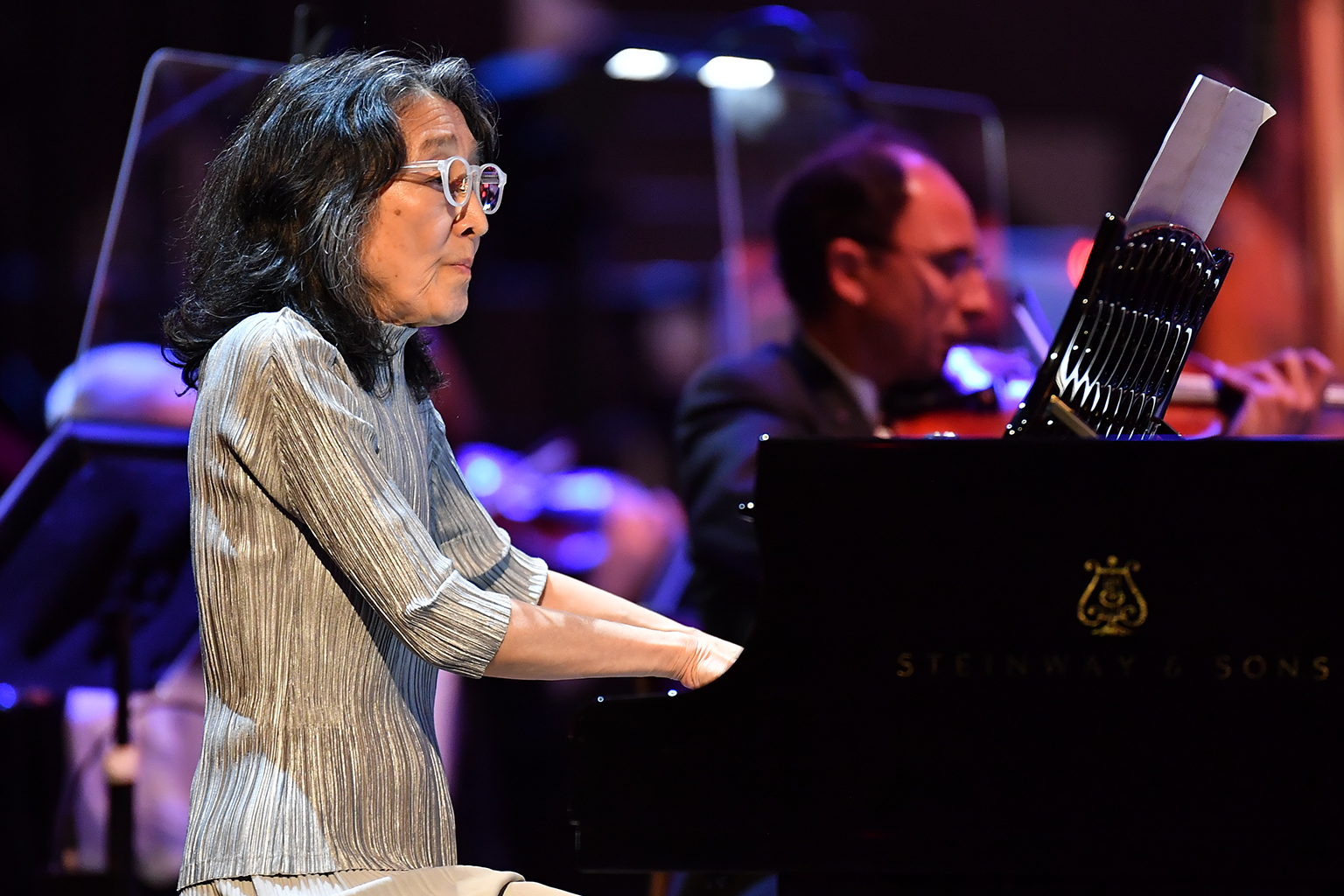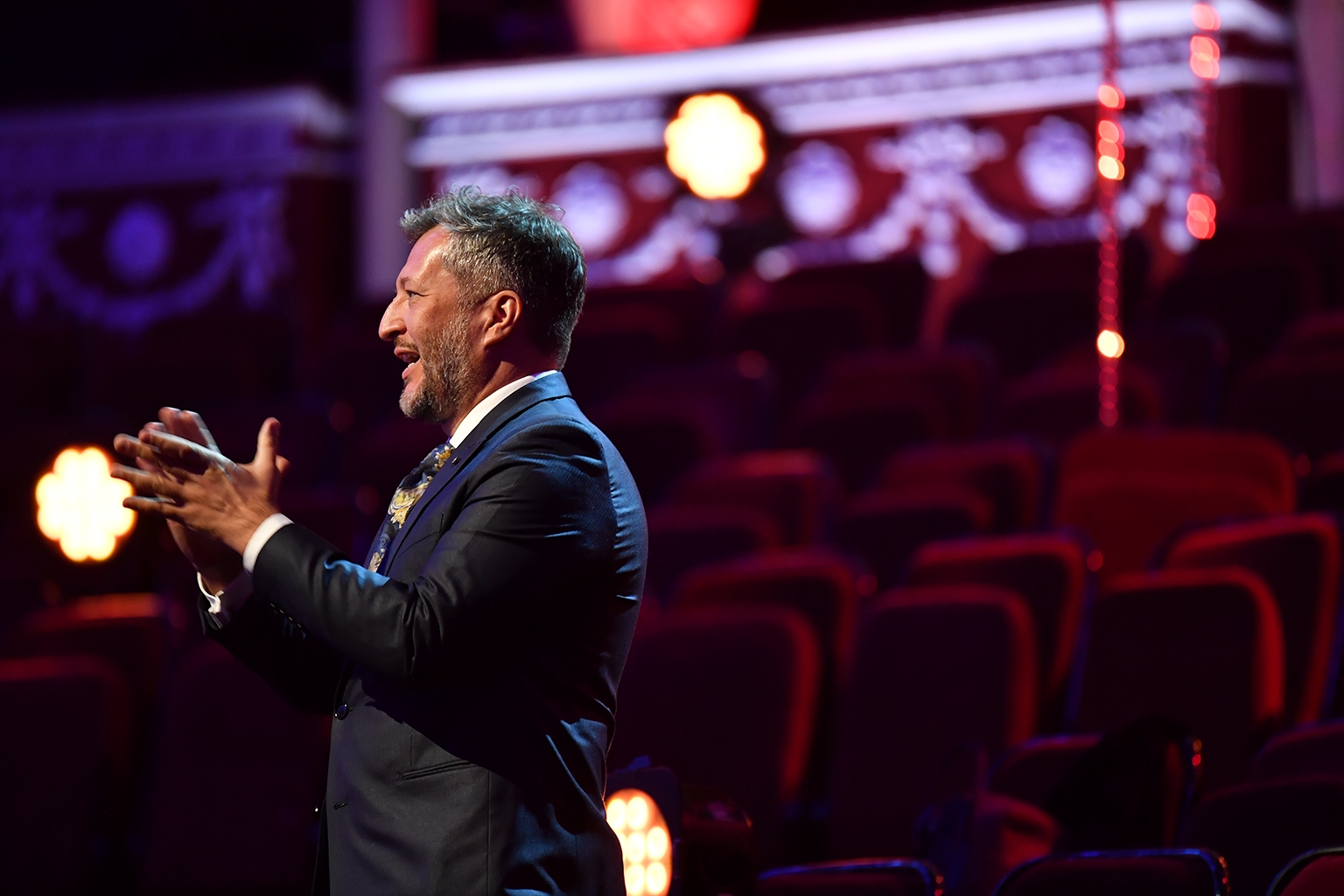BBC Proms live online: Uchida, LSO, Rattle review – eclectic concert makes good TV | reviews, news & interviews
BBC Proms live online: Uchida, LSO, Rattle review – eclectic concert makes good TV
BBC Proms live online: Uchida, LSO, Rattle review – eclectic concert makes good TV
Simon Rattle and BBC Four both make a virtue of some Covid necessities
Sunday night’s Prom by the London Symphony Orchestra was Simon Rattle’s 75th and surely his strangest.
The required distancing between players became the basis of the programming, from Gabrieli brass ensemble music with the players scattered around the RAH’s boxes, to György Kurtág’s …quasi una fantasia… that, although written in 1988, has social distancing built into it. Only at the end, for Vaughan Williams’s Fifth Symphony, did all the players come together in relatively conventional formation, for what was the highlight of the evening. The physical separation of the players even in this piece clearly made ensemble playing more difficult – especially with perspex barriers also in place – but for the most part the ensemble was very good.
Watching BBC Four’s coverage was enjoyable for lots of reasons – the camera-work was resourceful, the editing less twitchy and fussy than usual – but of course the spatial effects don’t really come over aurally. The segueing between pieces made a virtue of the lack of audience applause, and the cameras had freer rein to move around without worrying about disturbing – or knocking over – Prommers. 
The Kurtág that followed was a terrific juxtaposition, starting with the piano alone before the strange line-up of percussion entered. Sadly the strangeness of the percussive effects were flattened out by TV, the fragility of the sound lost in the warmth and compression of the broadcast sound.
After more crisp Gabrieli we had a world premiere, Thomas Adès’s Dawn, an obvious choice of composer for his long-time champion, Rattle. The piece is a chaconne, built over a repeating phrase, which was only one clue to the fact the piece was written in a hurry (presumably during lockdown).
Featuring Uchida as orchestral pianist, the music started with smudgy arpeggios (perhaps a reference to the Beethoven sonata?) on harp, cimbalom, gongs and vibraphone that persisted through the whole piece. There were solos thrown over the top and the almost entirely diatonic music built to a gleaming C major ending. Pleasingly scored – the timbres coming over better than in the Kurtág – it was compositionally underbaked. Acclaiming it an “instant classic” as Suzy Klein did was, apart from being an example of some broadcasters’ need to tell us how to react, clearly an overstatement that would surely embarrass rather than delight the composer (pictured below).
The last movement is, like the Adés, a passacaglia, but a fully conceived one. The passing around of the theme is masterly and the counterpoint worthy of the old masters RVW revered. But it is clothed in an essentially English modality that, while perhaps sounding old-fashioned in 1943, has a certain contemporary edge today. The final chords saw Rattle almost brought to tears by the music, his heartfelt whispered “bravo” to the players a more fitting end than any amount of applause.
- Watch this concert on BBC Four and/or listen on BBC Radio 3 for the next month
- Full programme of livestreamed BBC Proms here
- Read more classical reviews on theartsdesk
rating
Explore topics
Share this article
The future of Arts Journalism
You can stop theartsdesk.com closing!
We urgently need financing to survive. Our fundraising drive has thus far raised £49,000 but we need to reach £100,000 or we will be forced to close. Please contribute here: https://gofund.me/c3f6033d
And if you can forward this information to anyone who might assist, we’d be grateful.

Subscribe to theartsdesk.com
Thank you for continuing to read our work on theartsdesk.com. For unlimited access to every article in its entirety, including our archive of more than 15,000 pieces, we're asking for £5 per month or £40 per year. We feel it's a very good deal, and hope you do too.
To take a subscription now simply click here.
And if you're looking for that extra gift for a friend or family member, why not treat them to a theartsdesk.com gift subscription?
more Classical music
 Helleur-Simcock, Hallé, Wong, Bridgewater Hall, Manchester review - moving lyricism in Elgar’s concerto
Season opener brings lyrical beauty, crisp confidence and a proper Romantic wallow
Helleur-Simcock, Hallé, Wong, Bridgewater Hall, Manchester review - moving lyricism in Elgar’s concerto
Season opener brings lyrical beauty, crisp confidence and a proper Romantic wallow
 Kohout, Spence, Braun, Manchester Camerata, Huth, RNCM, Manchester review - joy, insight, imagination and unanimity
Celebration of the past with stars of the future at the Royal Northern College
Kohout, Spence, Braun, Manchester Camerata, Huth, RNCM, Manchester review - joy, insight, imagination and unanimity
Celebration of the past with stars of the future at the Royal Northern College
 Jansen, LSO, Pappano, Barbican review - profound and bracing emotional workouts
Great soloist, conductor and orchestra take Britten and Shostakovich to the edge
Jansen, LSO, Pappano, Barbican review - profound and bracing emotional workouts
Great soloist, conductor and orchestra take Britten and Shostakovich to the edge
 Jakub Hrůša and Friends in Concert, Royal Opera review - fleshcreep in two uneven halves
Bartók kept short, and a sprawling Dvořák choral ballad done as well as it could be
Jakub Hrůša and Friends in Concert, Royal Opera review - fleshcreep in two uneven halves
Bartók kept short, and a sprawling Dvořák choral ballad done as well as it could be
 Hadelich, BBC Philharmonic, Storgårds, Bridgewater Hall, Manchester review - youth, fate and pain
Prokofiev in the hands of a fine violinist has surely never sounded better
Hadelich, BBC Philharmonic, Storgårds, Bridgewater Hall, Manchester review - youth, fate and pain
Prokofiev in the hands of a fine violinist has surely never sounded better
 Monteverdi Choir, ORR, Heras-Casado, St Martin-in-the-Fields review - flames of joy and sorrow
First-rate soloists, choir and orchestra unite in a blazing Mozart Requiem
Monteverdi Choir, ORR, Heras-Casado, St Martin-in-the-Fields review - flames of joy and sorrow
First-rate soloists, choir and orchestra unite in a blazing Mozart Requiem
 Cho, LSO, Pappano, Barbican review - finely-focused stormy weather
Chameleonic Seong-Jin Cho is a match for the fine-tuning of the LSO’s Chief Conductor
Cho, LSO, Pappano, Barbican review - finely-focused stormy weather
Chameleonic Seong-Jin Cho is a match for the fine-tuning of the LSO’s Chief Conductor
 Classical CDs: Shrouds, silhouettes and superstition
Cello concertos, choral collections and a stunning tribute to a contemporary giant
Classical CDs: Shrouds, silhouettes and superstition
Cello concertos, choral collections and a stunning tribute to a contemporary giant
 Appl, Levickis, Wigmore Hall review - fun to the fore in cabaret and show songs
A relaxed evening of light-hearted fare, with the accordion offering unusual colours
Appl, Levickis, Wigmore Hall review - fun to the fore in cabaret and show songs
A relaxed evening of light-hearted fare, with the accordion offering unusual colours
 Lammermuir Festival 2025, Part 2 review - from the soaringly sublime to the zoologically ridiculous
Bigger than ever, and the quality remains astonishingly high
Lammermuir Festival 2025, Part 2 review - from the soaringly sublime to the zoologically ridiculous
Bigger than ever, and the quality remains astonishingly high
 BBC Proms: Ehnes, Sinfonia of London, Wilson review - aspects of love
Sensuous Ravel, and bittersweet Bernstein, on an amorous evening
BBC Proms: Ehnes, Sinfonia of London, Wilson review - aspects of love
Sensuous Ravel, and bittersweet Bernstein, on an amorous evening
 Presteigne Festival 2025 review - new music is centre stage in the Welsh Marches
Music by 30 living composers, with Eleanor Alberga topping the bill
Presteigne Festival 2025 review - new music is centre stage in the Welsh Marches
Music by 30 living composers, with Eleanor Alberga topping the bill

Add comment